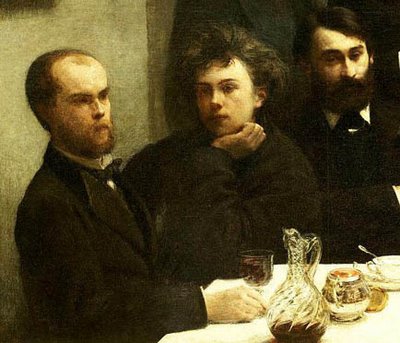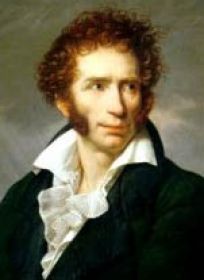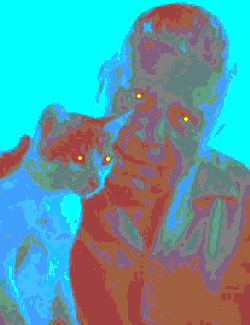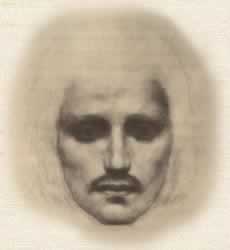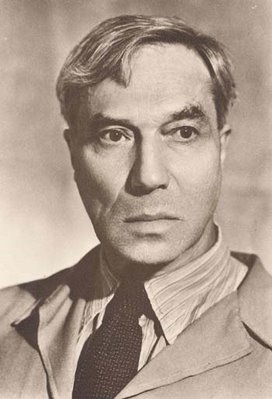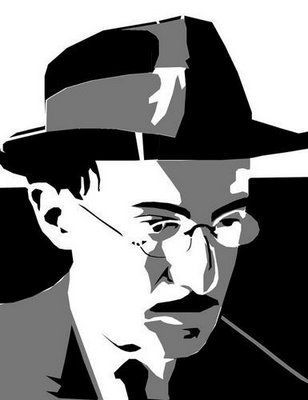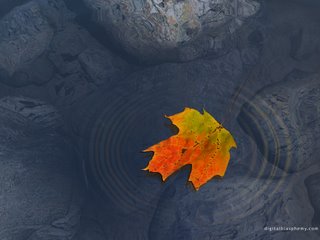ODE AL LIBRO I & II - ODE TO THE BOOK I & II
~ Pablo Neruda
~ Odi
(originale spagnolo) ODA AL LIBRO I Libro, cuando te cierro abro la vida. Escucho entrecortados gritos en los puertos. Los lingotes del cobre cruzan los arenales, bajan a Tocopilla. Es de noche. Entre la islas nuestro océano palpita con sus peces. Toca los pies, los muslos, Las costillas calcáreas de mi patria. Toda la noche pega en sus orillas y con la luz de día amanece cantando como si despertara una guitarra. A mí me llama el golpe del océano. A mí me llama el viento, y Rodríguez me llama, José Antonio, recibí un telegrama del sindicato "Mina" y ella, la que yo amo (no les diré su nombre), me espera en Bucalemu. Libro, tú no has podido empapelarme, no me llenaste de tipografía, de impresiones celestes, no pudiste encuadernar mis ojos, salgo de ti a poblar las arboledas con la ronca familia de mi canto, a trabajar metales encendidos o a comer carne asada junto al fuego en los montes. Amo los libros exploradores, libros con bosque o nieve, profundidad o cielo, pero odio el libro araña en donde el pensamiento fue disponiendo alambre venenoso para que allí se enrede la juvenil y circundante mosca. Libro, déjame libre. Yo no quiero ir vestido de volumen, yo no vengo de un tomo, mis poemas no han comido poemas, devoran apasionados acontecimientos, se nutren de intemperie, extraen alimento de la tierra y los hombres. Libro, déjame andar por los caminos con polvo en los zapatos y sin mitología: vuelve a tu biblioteca, yo me voy por las calles. He aprendido la vida de la vida, el amor lo aprendí de un solo beso, y no pude enseñar a nadie nada sino lo que he vivido, cuanto tuve en común con otros hombres, cuanto luché con ellos: cuanto expresé de todos en mi canto. | (traduzione italiana di K) ODE AL LIBRO I Libro, quando ti chiudo apro la vita. Ascolto intermittenti grida nei porti. I lingotti di rame attraversano gli arenili, scendono a Tocopilla. È notte. Fra le isole il nostro oceano palpita con i pesci. Tocca i piedi, le cosce, le costole calcaree della mia patria. Tutta la notte abbraccia le sue spiagge e con la luce del giorno si sveglia cantando come se eccitasse una chitarra. Mi chiama il fragore dell’oceano. Mi chiama il vento, e mi chiama Rodriguez, José Antonio -- ho ricevuto un telegramma dal sindacato "Miniera" e colei che amo (non ti dirò il suo nome), mi aspetta a Bucalemu. Libro, tu non hai potuto incartarmi, non mi hai riempito di tipografia, di impressioni celesti, non hai potuto inquadernarmi gli occhi, Esco da te per popolare gli arboreti con la rauca famiglia del mio canto, a lavorar metalli brucianti o a mangiar carne affumicata vicino ai fuochi tra le montagne. Amo i libri avventurosi, libri con boschi o nevi, profondità o cielo, però odio il libro aracnide dove il pensiero ha posato un filo velenoso per intrappolare la mosca giovane e ronzante. Libro, lasciami andare. Non chiedo di andar vestito di volumi, non vengo fuori da un tomo, i miei poemi non mangiano poemi -- divorano eventi appassionati, si nutrono di intemperie, estraggono alimenti dalla terra e dagli uomini. Libro, fammi andar via con polvere sulle scarpe e senza mitologia: torna alla tua biblioteca, io me ne vado in giro per le strade. Ho appreso la vita dalla vita stessa, l’amore l’ho appreso da un solo bacio, e non posso insegnar niente a nessuno se non che ho vissuto con qualcosa in comune con altri uomini, quando ho combattuto con loro, quando ho espresso tutto di loro nei miei canti. |
(traduzione italiana) ODE AL LIBRO II Libro bello, libro, minimo bosco, foglio dopo foglio, odora la tua carta di elemento, sei mattutino e notturno, cereale, oceanico, nelle tue antiche pagine cacciatori di orsi, falò vicino al Mississipi, canoe sulle isole, più tardi strade e strade, rivelazioni, popoli insorti, Rimbaud come un ferito pesce sanguinante che palpita nella melma, e la bellezza della fratellanza, pietra su pietra si edifica il castello umano, dolori che intessono la fermezza, azioni solidali, libro nascosto di tasca in tasca, lampada clandestina, stella rossa. Noi poeti erranti esploriamo il mondo, e in ogni porta ci ricevette la vita, noi prendiamo parte alla lotta sulla terra. Quale fu la nostra vittoria? Un libro, un libro pieno di contatti umani, di camicie, un libro che non conosce la solitudine, con uomini ed utensili, un libro è la vittoria. Vive e cade come tutti i frutti, non soltanto ha luce, non soltanto ha ombra, ma si spegne, si sfoglia, si perde fra le strade, crolla a terra. Libro di poesia del domani, torna ancora ad avere neve o muschio nelle tue pagine perché le impronte o gli occhi lascino tracce: descrivici di nuovo il mondo, le sorgenti nei folti boschi, gli alti albereti, i pianeti polari, e l'uomo sui cammini, sui nuovi cammini, che avanza nella selva, nell'acqua, nel cielo, nella nuda solitudine marina, l'uomo che scopre gli ultimi segreti, l'uomo che ritorna con un libro, il cacciatore che ritorna con un libro, il contadino che ara con un libro. | (originale spagnolo) ODA AL LIBRO II Libro hermoso, libro, minimo bosque, hoja tras hoja, huele tu papel a elemento, eres matutino y nocturno, cereal, oceanico, en tus antiguas paginas cazadores de osos, fogatas cerca del Mississípi, canoas en las islas, mas tarde caminos y caminos, revelaciones, pueblos insurgentes, Rimbaud como un herido pez sangriento palpitando en el lodo, y la hermosura de la fraternidad, piedra por piedra sube el castillo humano, dolores que entretejen la firmeza, acciones solidarias, libro oculto de bolsillo en bolsillo, lampara clandestina, estrella roja. Nosotros los poetas caminantes exploramos el mundo, en cada puerta nos recibió la vida, participamos en la lucha terrestre. Cuàl fue nuestra victoria? Un libro, un libro lleno de contactos humanos, de camisas, un libro sin soledad, con hombres y herramientas, un libro es la victoria. Vive y cae corno todos los frutos, no solo tiene luz, no solo tiene sombra, se apaga, se deshoja, se pierde entre las calles, se desploma en la tierra. Libro de poesia de mañana, otra vez vuelve a tener nieve o musgo en tus pàginas para que las pisadas o los ojos vayan grabando huellas: de nuevo describenos el mundo, los manantiales entre la espesura, las altas arboledas, los planetas polares, y el hombre en los caminos, en los nuevos caminos, avanzando en la selva, en el agua, en el cielo, en la desnuda soledad marina, el hombre descubriendo los ültimos secretos, el hombre regresando con un libro, el cazador de vuelta con un libro, el campesino arando con un libro. |
~English translations:
ODE TO THE BOOK I translated by Nathaniel Tarn When I close a book I open life. I hear faltering cries among harbours. Copper ignots slide down sand-pits to Tocopilla. Night time. Among the islands our ocean throbs with fish, touches the feet, the thighs, the chalk ribs of my country. The whole of night clings to its shores, by dawn it wakes up singing as if it had excited a guitar. The ocean's surge is calling. The wind calls me and Rodriguez calls, and Jose Antonio-- I got a telegram from the "Mine" Union and the one I love (whose name I won't let out) expects me in Bucalemu. No book has been able to wrap me in paper, to fill me up with typography, with heavenly imprints or was ever able to bind my eyes, I come out of books to people orchards with the hoarse family of my song, to work the burning metals or to eat smoked beef by mountain firesides. I love adventurous books, books of forest or snow, depth or sky but hate the spider book in which thought has laid poisonous wires to trap the juvenile and circling fly. Book, let me go. I won't go clothed in volumes, I don't come out of collected works, my poems have not eaten poems-- they devour exciting happenings, feed on rough weather, and dig their food out of earth and men. I'm on my way with dust in my shoes free of mythology: send books back to their shelves, I'm going down into the streets. I learned about life from life itself, love I learned in a single kiss and could teach no one anything except that I have lived with something in common among men, when fighting with them, when saying all their say in my song. | ODE TO THE BOOK II Book, beautiful book, little forest, leaf after leaf, your paper smells of the elements, you are daily and nocturnal, grain, ocean; in your ancient pages bear hunters, bonfires along the Mississippi, canoes in the islands, later on roads and more roads, revelations, rebellious towns, Rimbaud, like an injured blood-soaked fish gasping in the mud, and the beauty of brotherhood, stone by stone building the human castle, grief interwoven with firmness, solidarity; occult book passed from pocket to pocket, a secret lamp a red star. We the wandering poets explored the world, life welcomed us at every door, we joined in the earthly struggle. What was our victory? A book, a bookfilled with human connections, with shirts, without isolation, with men and tools, a book is our victory. A bookripens and falls like all fruits, it has light and shadow, but its pages are torn away, it gets lost in the streets, buried in the earth. Book of poetry dawning, come back again to hold snow or moss in your pages so that the footsteps or the eyes can leave their traces; once again describe the world for us of freshwater springs in the thickets, groves of tall trees, the polar planets, and human beings on the roads, on the new roads, advancing in the jungle, on the water, in the sky, in the naked solitude of the sea, human beings discovering the ultimate secrets, human beings returning with a book, the hunter coming home with a book, the farmer working the land with a book. |
Etichette: bilinguismo, Neruda, Ode al libro/Ode to the book, poesia, trilingue
 ...e tu?
...e tu?









